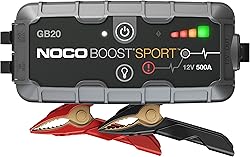Noco is a very well-known name in the battery charger and jump-start battery pack sector, and they have a variety of models. In this short review, we compare their base GB20 jump starter with the following two larger models.
Our review picks out the essential differences between the jump starter models and suggests which one you should buy.
NOCO GB20 vs GB40 vs GB50: Key Things In Common
Since the three products on the review are all made by Noco, you’d expect significant similarities.
Design
The three Noco jump-starters overall look is identical, of course, and they look rugged and purposeful.
All three feature the black and grey color scheme synonymous with Noco products, making them instantly recognizable. The front panels of them all are the same except for minor layout and name differences.
Features
Again, the three Noco jump starters offer the same range of features. You’ll find a USB In, a USB Out, and a 12V Out port on each of them. Each product has an LED light, although the power rating varies.
Ont e front panel, each has a battery level indicator and a manual override button.
In addition to jump-starting flat car batteries, each Noco model can be used to recharge your USB devices, such as smartphones or tablets.
Safety
As you would expect, the three models also offer the same safety features. These include reverse polarity checker and spark-proof connection technology.
NOCO GB20 vs GB40 vs GB50: Key Differences
 Noco GB20 |  Noco GB40 |  Noco GB50 |
|
|---|---|---|---|
| Customer Rating |  |  |  |
| Price |  |  |  |
| Size (inches) | 3.2 x 1.7 x 7.7 | 6.57 x 3.15 x 7.72 | 7.7 x 3.4 x 1.9 |
| Jump Starts Per Charge | Up to 20 | Up to 20 | Up to 30 |
| Supported Engines | Up to 4.0-liter gas Not suitable for diesel | Up to 6.0-liter gas Up to 3.0-liter diesel | Up to 7.0-liter gas Up to 4.5-liter diesel |
| Internal Battery | 24 Watt-hour lithium | 24 Watt-hour lithium | 35 Watt-hour lithium |
| Charging Time (2A charger) | 3 hours | 3 hours | 4 hours |
| 12V Port | -- | -- | -- |
| USB Port | ✔ | ✔ | ✔ |
| Spark-proof technology | ✔ | ✔ | ✔ |
| On/Off Safety Switch | ✔ | ✔ | ✔ |
| Manual Override | ✔ | ✔ | ✔ |
| Flash light/ LED light | 100 lumen LED | 100 lumen LED | 200 lumen LED |
| Approx Price | Around $80 | Around $100 | Around $150 |
| Pros | + Price is only around $80 + Compact size- the smallest Noco jumper + Up to 20 jump starts per charge | + Works with a large number of engine sizes + Affordable price for a powerful jump starter | + Huge peak current to start almost any car engine + Up to 30 jump starts per charge + 200 lumen LED light |
| Cons | - Cannot used for diesel engines - Only come with a drawn string bag | - Need to buy the case separately | - A zippered hard case should be included, not a drawstring bag - Price is twice as high as GB20 |
| Score | 8.5 | 9.5 | 8.5 |
We’ve briefly looked at similarities between the Noco GB20, GB40, and GB50, so now a more detailed look at the differences.
While they are all designed to jump-start a car with a flat battery, they are aimed at different markets. There is little point in buying the most powerful version and spending more money when you own a car with a small engine.
LED Light
There is not much to differentiate the three models based on features and functions, as you can probably guess. All three feature an LED light, but while the GB20 and GB40 versions offer 100 lumens, the GB50 light is double the brightness at 200 lumens.
Internal Battery Capacity
The GB50 also scores higher on the number of jump-starts it can manage from a single charge. The GB20 and GB40 offer an impressive 20 attempts, while the GB50 gives ten more at up to 30 starts.
Dimensions
All three Noco models look almost identical, except in size. To accommodate the larger batteries, a model’s size and weight will vary with the power offered. In this case, the GB20 and GB40 are identical in weight and size.
But the GB50 is almost an extra inch longer and slightly larger in width and height. Not a huge difference, but it may matter if you have a particular cubby hole where you want to store the jump-starter.
Supported Vehicles
What vehicles each jump-starter will work on is one area where the three models differ significantly. This is purely down to the battery’s size and the peak current it is capable of providing. Although all three are designed to jump-start cars with 12 volt electrical systems, the engine’s size is the determining factor.
The smallest here is the GB20, with a peak current of 500 amps. This is still an impressive output and will allow you to jump-start gasoline engines up to 4.0 liters. Noco doesn’t recommend the GB20 for diesel engines.
Next up is the GB40, with a peak current rating of 1000 amps. Noco suggests this is suitable for up to 6.0-liter gas engines and 3.0-liter diesel engines.
Last, the GB50 offers a powerful punch of 1500 peak amps. Noco says this is enough for a gas engine of up to 7.0 liters or a diesel engine up to 4.5 liters.
Price, Warranty
As you would expect, all three models have the same one-year manufacturer’s limited warranty.
Price-wise, you get what you pay for in terms of stating power. The smallest, the GB20, retails at around $80, while the larger GB50 is about $150. The mid-range GB40 will set you back around $100.
Which Noco Model Should You Buy?
Noco GB20: Compact Jump Starter For Small Engine Vehicles

Pros
- Afforadable price with $80
- Up to 20 jump starts per charge
- Compact jump starter for most small engine gasoline cars
Cons
- Not recommended for diesel engines
- A better carrying case should be included
The GB20 is the baby model of the range and is aimed at the small car owner. If you own a small runabout with a gasoline engine smaller than 4.0 liters, this is all you need.
Noco GB40: Good Value Jumper Pack At Affordable Price

Pros
- Works with a large number of engine sizes
- Good value with 1000 peak current amp
- Up to 20 jump starts per charge
Cons
- LED light is only 100 lumen
- Need to buy the case separately
The midrange GB40 is probably the one most people should buy. It can start gas engines up to 6.0 liters and diesel engines up to 3.0 liters, covering a vast range of models. It is good value, being only slightly more expensive than the base model, GB20.
Note: GB40 comes with a cloth bag, not a hardshell case. You can buy a storage case for your jumpstarter separately if you want on Amazon. It costs around $17 but it’s worth the investment to easily hold and protect all of the included components.
Protection Case For GB20/GB40

Noco GB50: An Awesome Unit For Big Trucks

Pros
- Can start almost any car engine
- Huge peak current
- Up to 30 jump starts per charge
- 200 lumen LED light
Cons
- Price is twice as high as GB20
- A zippered hard case should be included, not a drawstring bag
If you need real starting power for a large engine, then the GB50 could be perfect. It can start up to 7.0-liter gas and 4.5-liter diesel engines, so there are very few that will stump it.
FAQs
Can the jump starters be used on other 12 volt vehicles?
Yes. Although we specifically mention cars in the review, the jump-starters will work on any 12-volt electrical system. They are ideal for ATVs, motorcycles, jet skis, and many other vehicles. Just make sure you get one powerful enough for the engine.
Will a jump-starter charge my battery?
No, these models are only designed to give a high current for a short time to get your engine started. It would be best if you then charge your battery with a standard battery charger.
How long are the starter cables?
In all cases, not just Noco models, the starter cables are pretty short, around a foot long.
In most cases, this won’t be a problem, but if needed, Noco recommends users either use remote jump-starting posts or connect the positive lead to the positive terminal and the negative lead to a reachable common ground.
Can you use a jump starter with all battery types?
All of Noco jump starters are only intended for single 12V lead-acid batteries
Should I leave the jump-starter plugged into the mains socket to keep it charged?
This isn’t a good idea. Once charged, the internal battery pack will hold its charge for around a year, although it would be a good idea to top up the battery after six months.

